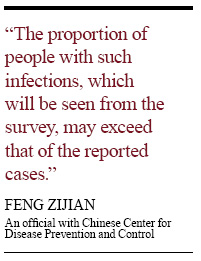Society
Survey helps to combat H1N1 spread
By Shan Juan (China Daily)
Updated: 2010-01-01 09:32
 |
Large Medium Small |
A nationwide survey beginning this month that will check for the presence of antibodies formed as a response to H1N1 flu infections will target at least 54,000 people chosen at random from different age groups, the Ministry of Health (MOH) said on Wednesday.

The anti-H1N1 flu effort comes as the backdrop of WHO Director-General Margaret Chan's warning that the pandemic may not be subdued until 2011.
"To help decide future strategy for H1N1 flu prevention and control, we need to know through the upcoming survey the existing immunity to this pathogen among the population," Feng Zijian, director of the emergency response department of the Chinese Center for Disease Prevention and Control, told China Daily yesterday.
The blood sample of each of those surveyed will be tested for antibodies in a bid to predict disease activity related to the virus, the MOH said.
Nearly 100,000 H1N1 flu cases have been reported on the mainland, and over 47 million people have been vaccinated against the flu strain.
Yet what is worrying is that many cases of H1N1 infection have gone unreported. Such cases may number in the many thousands.
Since any data on the virus will prove crucial in the fight against the pandemic, the government will conduct the serological survey - a scientific study of blood serum to check for the presence of antibodies that are usually formed in response to infections like the H1N1 virus - to test those who may have been infected.
|
"The proportion of people with such infections, which will be seen from the survey, may exceed that of the reported cases," he said.
However, people who have been vaccinated against the H1N1 virus will not form part of the survey, he clarified.
Many people infected by the virus may not have shown severe symptoms, and could have recovered without medication.
"They might have never seen a doctor. Consequently, they would not have been reported as an H1N1 flu case," Feng explained.
As with other parts of the world, the spread of the pandemic had slowed in China by the end of 2009, with the number of reported H1N1 flu cases and deaths showing a slower rate of growth, official statistics indicated.
"The immunity level among the populace should have increased ever since the flu was first detected in May," Feng said.
Health authorities, however, have repeatedly warned that pregnant women were at the greatest risk of contracting the virus. The death rate among H1N1-infected pregnant women was 20 to 40 times more than that among the general public, they said.
Pregnant women formed nearly 14 percent of the H1N1 fatalities on the mainland, official data showed.
The MOH issued guidelines on H1N1 control and treatment for pregnant women on Wednesday.










